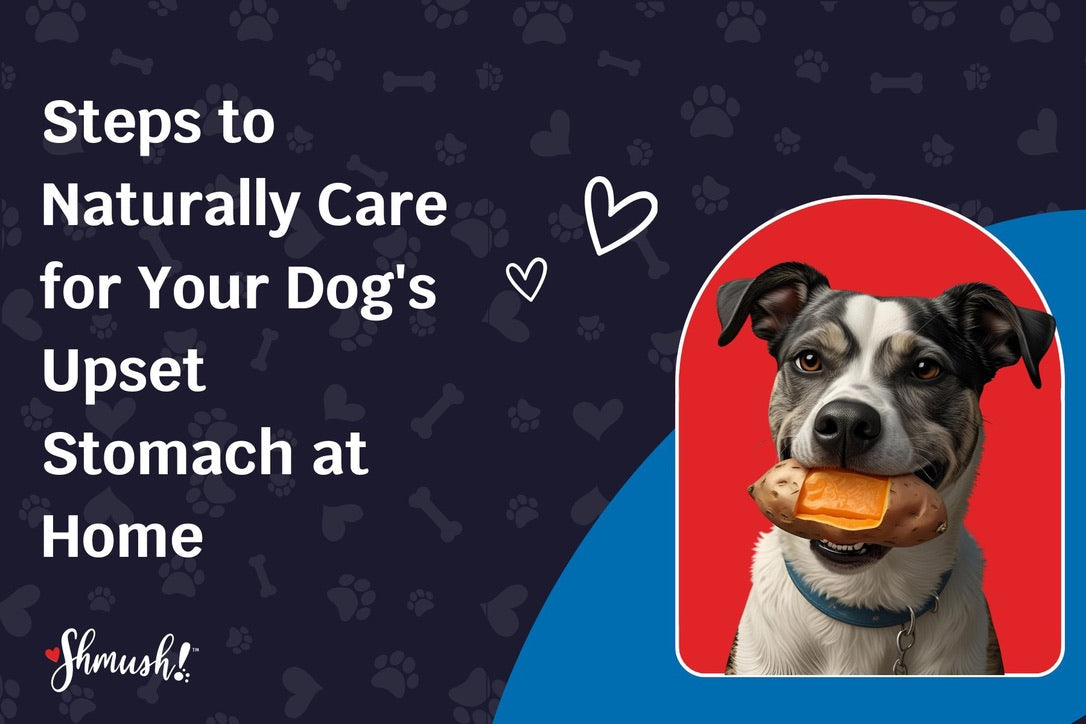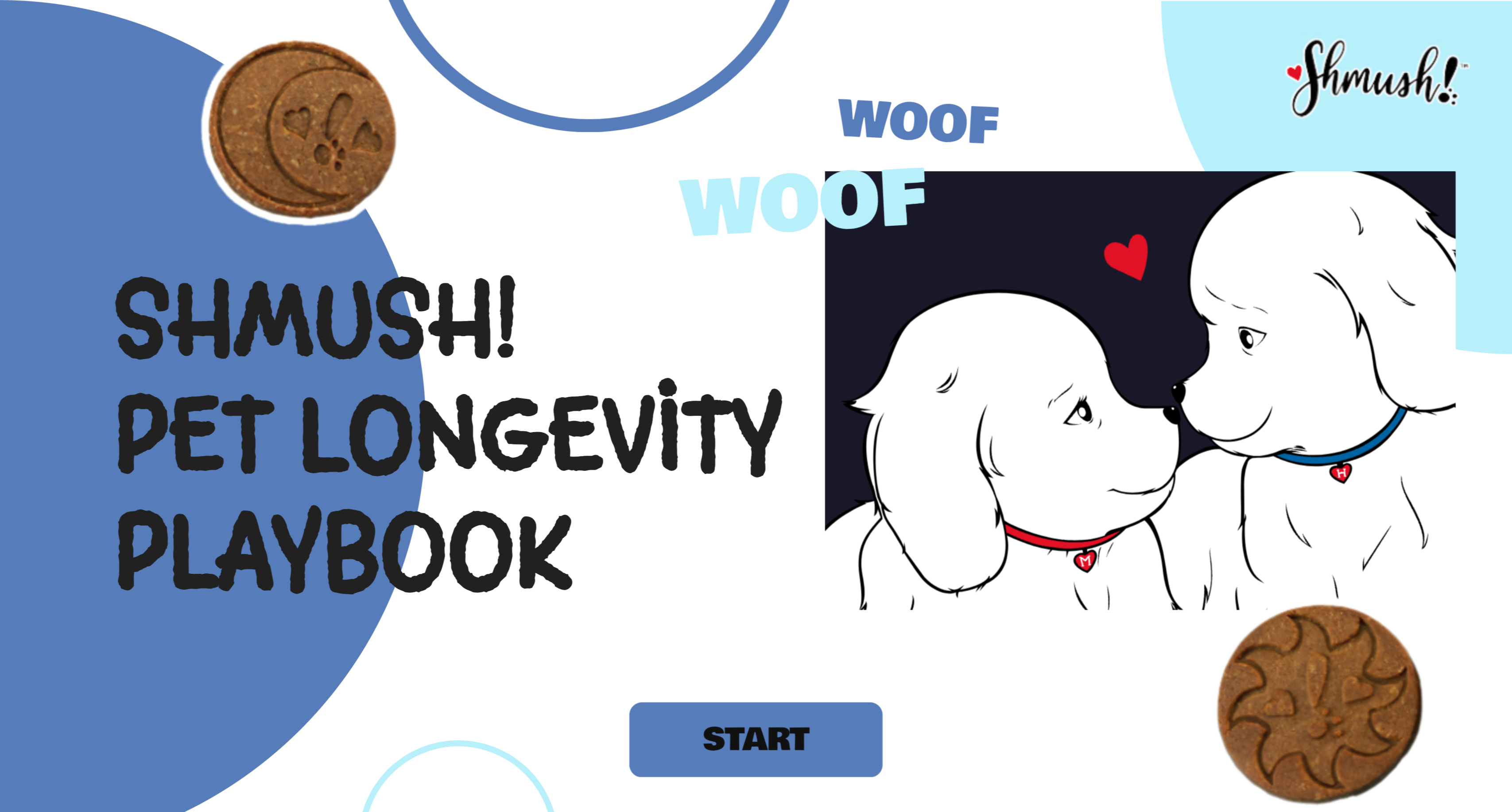

🐶 Natural Ways to Soothe Your Dog’s Upset Stomach at Home
We all know that uneasy feeling when our dogs aren’t acting like themselves—especially when their tummies are in turmoil. At Shmush!, we believe in supporting your pup’s wellness with the same love and care you'd give a child. That means knowing what to do when your dog’s stomach goes rogue—naturally, safely, and thoughtfully.
Here’s your guide to helping your dog through a mild upset stomach using natural methods—plus when to call in the pros.
🐾 Common Causes of a Dog’s Upset Stomach
Before treating, it helps to understand the why. Some common causes include:
-
🦴 Eating inappropriate items (hello, mystery trash)
-
🍗 Food allergies or reactions to new meds
-
🪱 Intestinal parasites
-
🍽 Sudden food changes without transition
-
🔥 Acute pancreatitis (often from high-fat foods)
-
🚗 Motion sickness or vestibular issues
-
⚠️ Less common causes: stomach ulcers, IBS, even certain cancers
If the symptoms are mild—like a little vomiting, diarrhea, or gurgly tummy—you may be able to care for your pup at home with some natural TLC.
💧 Step 1: Keep Your Dog Hydrated
Hydration is critical when your dog has vomiting or diarrhea.
Hydration Tips:
-
Offer ice chips if your dog can’t keep water down
-
Try honey water (1 tsp honey in 1 cup warm water) to soothe and hydrate
-
Offer bone broth—warm, gentle, and full of electrolytes (no onions or garlic, please!)
Even a few laps of liquid here and there can help prevent dehydration.
⏳ Step 2: Implement a Gentle Fasting Routine
Give their digestive system a chance to rest.
How Long to Fast:
-
12–24 hours (adults only; consult your vet for puppies or seniors)
-
Offer water or bone broth throughout
Fasting reduces irritation and gives the gut time to settle—like a reset button for their belly.
🍚 Step 3: Introduce a Bland Diet
After fasting, start with easy-on-the-tummy foods.
Bland Diet Favorites:
-
Boiled chicken + white rice
-
Mashed sweet potatoes or plain pumpkin
-
Baby food (check for dog-safe, meat-based options with no garlic/onion)
Feed small portions every 3–4 hours and gradually return to their regular diet over a few days.
🌿 Step 4: Add Fiber-Rich, Belly-Friendly Foods
Fiber helps regulate digestion and ease tummy trouble.
Safe Options Include:
-
Pumpkin purée (not pie filling!)
-
Boiled sweet potatoes
-
Green bananas (yes, they’re gentler than ripe ones!)
-
Steamed carrots or spinach
Introduce slowly to avoid gas or bloating. These can also be mashed into your pup’s bland meals.
🍃 Step 5: Use Herbal & Natural Remedies
A few natural ingredients can work wonders—if you know what to use.
Vet-Approved Soothers:
-
Slippery elm bark – coats the stomach and soothes irritation
-
Ginger – settles nausea (grate fresh into broth or use powder sparingly)
-
Rosemary – anti-inflammatory, helps digestion (a tiny sprinkle!)
Natural Dewormers:
-
Pumpkin seeds – ground, not salted
-
Food-grade Diatomaceous Earth – use only with guidance from your vet
Always use these in moderation and check for allergies first.
🦠 Step 6: Add Probiotics and Electrolytes
Balance the gut flora and support recovery.
Probiotic Options:
-
Plain Greek yogurt (1–2 tsp for small dogs, 1–2 tbsp for large)
-
Dog-specific probiotic powders or chews
-
Kefir (plain, unflavored, and limited in quantity)
Electrolyte Boosts:
-
Unsweetened coconut water – hydrating and mineral-rich
-
Low-sodium chicken broth with a pinch of sea salt
Just don’t overdo it—these are supplements, not meals.
🚨 When to Call the Vet
If your pup shows any of the following signs, skip the DIY route and call your vet immediately:
-
Ongoing vomiting or diarrhea for more than 24 hours
-
Signs of lethargy, weakness, or dehydration
-
Blood in vomit or stool
-
Fever, bloated belly, or obvious pain
-
Pre-existing conditions like diabetes or kidney disease
🐕🦺 Final Woof: Caring for Your Dog Naturally
Your pup’s tummy troubles don’t have to be scary. With gentle fasting, hydrating broths, fiber-rich foods, and a whole lot of love, most mild stomach issues can be soothed naturally at home.
And when your dog is ready for solid treats again? Shmush! Vitamin Health Biscuits are a gentle, superfood-packed way to support their recovery—formulated by vets to be both delicious and nourishing.

Free Pet Longevity Playbook
Expert tips for helping your dog live a longer, healthier life—delivered straight to your inbox.